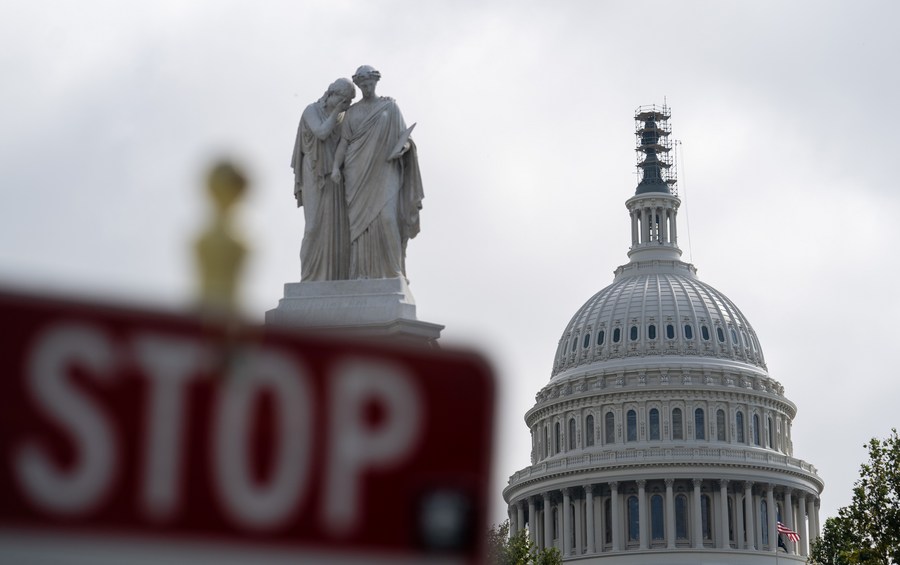Washington is not addicted to fentanyl -- but the money behind it
WASHINGTON, Oct. 15 (Xinhua) -- In a daycare center in New York City, one-year-old Nicholas Dominici closed his eyes forever. Three other infants, from eight months to two years old, had been taken to the emergency room. First responders were surprised to find that the children had been poisoned by fentanyl.
The center owner and others were found storing and distributing drugs in the nursery. Police found a kilogram of fentanyl and drug-making equipment near the mat where the children slept and played.
The case is only a tip of the iceberg of America's chronic drug epidemic.
The U.S. Department of Homeland Security noted in the Homeland Threat Assessment 2024 report that drugs kill and harm far more Americans annually.
The United States, despite being home to just 5 percent of the world's population, accounts for 80 percent of global opioid use. It declared a "war" on drugs more than 50 years ago, yet the "empire of pain" built by self-serving politicians and Big Pharma is still alive and killing.
"BIG PHARMA AS DRUG CARTEL"
"Painkiller," a Netflix series directed by Peter Berg, has been an instant hit since its release in August. In an interview, Berg said he decided to take on this project because he knew about a dozen people who had died from opioids.
"There wasn't a day that went by where some member of the crew wouldn't approach me ... And tell me the story of their loved one who had died of opioids," he said.
Opioids, primarily fentanyl, are the leading cause of U.S. overdose deaths, which have roughly quadrupled over the last 10 years, according to the Council on Foreign Relations. Data from the U.S. Centers for Disease Control and Prevention showed that the death toll from opioids surged to 79,770 in 2022.
That's "the equivalent of a 737 Boeing crashing and burning and killing everybody on board every single day," said Scott Higham, a co-author of the book "American Cartel" with Sari Horwitz.
The book presented how the U.S. pharmaceutical industry operated like a drug cartel, with manufacturers at the top, wholesalers in the middle and pharmacies at the level of "street dealers."
Like the Mexican drug lord El Chapo, the Sacklers, the family that owns OxyContin maker Purdue Pharma, used their money to persuade people to do their bidding, and threatened and intimidated those they couldn't put on their payroll.
From 1999 to 2017, a total of 200,000 Americans died from overdoses related to OxyContin and other prescription opioids. Meanwhile, around 13 billion U.S. dollars in profits of Purdue Pharma went to the Sacklers, according to court records and testimonies filed in the drugmaker's bankruptcy case.

This photo taken on Sept. 28, 2023 shows the U.S. Capitol building in Washington, D.C., the United States. (Xinhua/Liu Jie)
MONEY TALKS
How to get away with murder in the United States? Just lobby with money.
This is the answer given in "Empire of Pain," the 2021 book written by American investigative journalist Patrick Keefe.
A 2016 investigation by the Associated Press and the Center for Public Integrity found that drug companies and allied advocates spent more than 880 million dollars on lobbying and political contributions at the state and federal levels between 2006 and 2015. In addition, the opioid industry and its allies contributed to roughly 7,100 candidates for state-level offices.
The drug companies and allied groups have an army of lobbyists averaging 1,350 per year, covering all 50 state capitals. For over a decade, a group called the Pain Care Forum has met with some of the highest-ranking health officials in the federal government, while quietly working to influence proposed regulations on opioids and promote legislation and reports on the problem of untreated pain. The group is coordinated by the chief lobbyist for Purdue Pharma.
A New Yorker article pointed out that the U.S. Food and Drug Administration (FDA) approved OxyContin in 1995 as a treatment for moderate to severe pain, despite the lack of clinical studies on how addictive or prone to abuse the drug might be.
The FDA examiner who oversaw the process, Dr. Curtis Wright, left the agency shortly afterward. Within two years, he had landed a job with an annual payment of 400,000 dollars at Purdue.
In April 2016, Congress, instead of helping the federal agencies on the fight against drugs, passed the Ensuring Patient Medication and Effective Enforcement Act, which significantly limits the Drug Enforcement Administration's (DEA) ability to regulate Big Pharma.
The Washington Post reported that political action committees representing the industry contributed at least 1.5 million dollars to the 23 lawmakers who sponsored or co-sponsored four versions of the bill. Overall, the drug industry spent 102 million dollars on lobbying Congress on the bill and other legislation between 2014 and 2016, according to lobbying reports.
"I didn't know they were taking private money," said Michael Von Korff, a prominent pain care researcher. "It sounds like insanity to take money from principals of drug companies and then do reports related to opioids. I am really shocked."
As Higham said in his book, the DEA lost the war against opioids not to the cartels, but to lobbyists, lawmakers and K Street attorneys.
FAILED POLITICAL SYSTEM
The deadly disease of money-for-service has eroded all levels of the U.S. political system.
The symptoms? Systemic racism, gun violence, wealth disparity, and of course, the opioid pandemic.
American political activist Ezra Levin believes the social and economic problems in the country today are the product of long-term money politics, and out-of-touch politicians driven by ideologically and politically motivated interest groups.
"Our democracy is sick, and it's not an accident," said Levin.
Americans' trust in their government is collapsing. According to a Gallup poll released in July, only an average 26 percent of U.S. adults had a great deal or quite a lot of confidence in major U.S. institutions, the lowest level on record.
As long as money politics is at the heart of the American political system, it seems certain that the drug problem will continue to claim more innocent lives.
Photos
Related Stories
- U.S. House Republicans nominate right-wing Jordan for speaker amid continued divisions
- Venezuela denounces U.S. sanctions as "extortion and blackmail" after UN resolution against unilateral coercive measures
- Steve Scalise withdrawing from U.S. House speaker race amid intraparty division
- U.S. CPI rises 3.7 pct in September with core CPI accelerating
- Blinken meets Netanyahu, promises more arms support
Copyright © 2023 People's Daily Online. All Rights Reserved.









